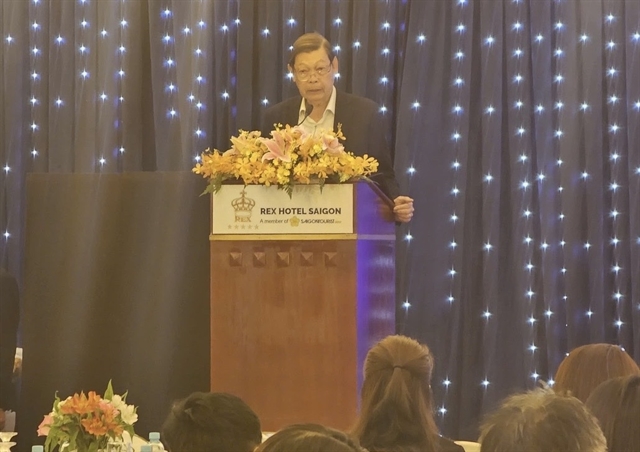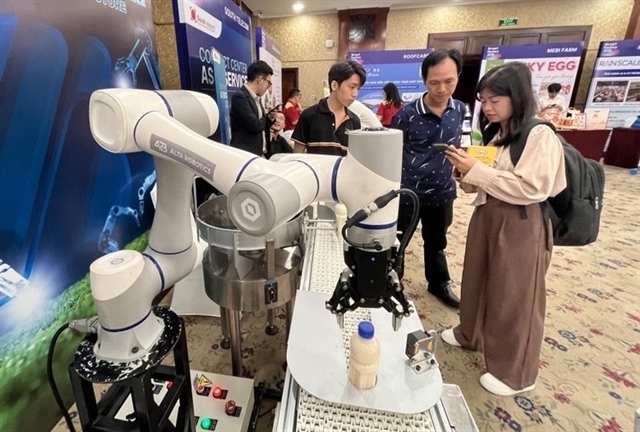 Society
Society


|
| Nguyễn Phước Hưng, vice chairman of the HCM City Union of Business Associations, speaks at the event. — VNA/VNS Photo |
HCM CITY — As HCM City reshapes its industrial landscape after expanding to include the key hubs of Bình Dương and Bà Rịa-Vũng Tàu, city leaders, experts, and businesses have urged a “dual transformation” – digital and green – to drive the next phase of growth.
Speaking at the "Smart Factory 2025: AI for Green Factory" conference in HCM City on Wednesday, Nguyễn Phước Hưng, vice chairman of the HCM City Union of Business Associations (HUBA), said the city and its extended region now boast more than 43,000 industrial enterprises and 90 industrial parks and export processing zones, forming a strong foundation for developing high-tech industrial clusters and intelligent supply chains.
“Under the city’s planning vision to 2050, there will be 105 industrial parks covering more than 49,000 hectares,” he said.
“This is a historic opportunity for HCM City to reshape its entire industrial structure – shifting toward technology-intensive, high value-added industries that create sustainable growth momentum.”
He said, however, that opportunities come with challenges. The city faces infrastructure bottlenecks, high logistics costs, and low labour productivity, while automation and global competition put pressure on traditional production models.
“Dual transformation – digital for intelligence and green for sustainability – is no longer optional,” he said. “We must integrate advanced technologies into production management and turn traditional industrial zones into smart and eco-industrial parks.”
AI applications in manufacturing, he noted, have shown strong results in improving productivity, cutting costs, and reducing downtime. Yet most small enterprises still struggle to access such technologies due to limited resources.
He called for HCM City to leverage its special mechanisms under Resolution 98, simplify procedures for “strategic projects,” and create breakthrough incentives in tax, land, and credit to support pioneering enterprises.
Võ Minh Thành, deputy director of the Department of Science and Technology, said the conference plays an important role in helping businesses apply AI and digital technologies to innovate production and improve competitiveness.
Real-life experiences
Nguyễn Thanh Quang, deputy general director for Technology at Bình Minh Plastic JSC, said the building materials industry faces fierce competition and market volatility, forcing firms to innovate.
“With the Net Zero 2050 goal, we had to rethink everything – how to stay competitive while being sustainable,” he said. “We’ve deployed robots, AI, and IoT to optimise costs and quality while using eco-friendly, heavy metal–free additives since 2017.”

|
| A model of a smart robotic arm on display at the conference. — VNA/VNS Photo |
Bình Minh Plastic has also integrated ESG (Environment-Society-Governance) principles into its strategy through a dedicated ESG office.
“Automation makes the factory smarter; green growth makes the business stand out,” he said. “But technology alone isn’t enough – companies must build human capacity to master it.”
Lê Trường Duy, director of the Center for the Fourth Industrial Revolution (C4IR) in HCM City, said AI is now “a decisive tool for Việt Nam’s manufacturers to stay competitive and sustainable.”
Smart factories, he added, will raise productivity and drive the green transformation toward net-zero goals.
“HCM City’s journey toward intelligent and sustainable manufacturing is both an economic imperative and a global responsibility,” said Dr. Nhiêu Nhật Lượng from the University of Economics HCM City.
“AI for green factories is where innovation meets conscience – and that’s the future of industry,” he said.
The event was jointly organised by HUBA, the HCM City Computer Association (HCA), and C4IR in HCM City. — VNS